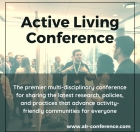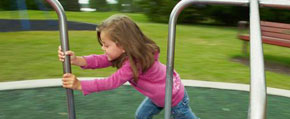Active Living Research has had a number of previous calls for proposals that you may wish to review. You may download and save the PDF versions for your reference.
Rounds
The 2010-2011 Rapid-Response Round 3 [pdf] call for proposals was released in May 2010 and funded 12 time-sensitive, opportunistic studies that evaluate natural experiments that occur when important policy and environmental changes take place in real-world environments.
Our tenth call for proposals and Active Living Research 2010—RWJF New Connections Round 3 [pdf] call for proposals was released in February 2010 and funded 16 studies focused on six research topics meant to increase physical activity and/or reduce sedentary behaviors. New Connections grants funded three junior investigators from historically disadvantaged and underrepresented communities.
The Active Living Research 2009—RWJF New Connections Round 2 [pdf] call for proposals was released in May 2009 and funded four small-scale or macro-level research studies and one publication grant to help increase scholarly productivity of junior investigators. The 2009 call for proposals is similar to the ALR 2008-RWJF New Connections CFP released in July 2008.
The 2009 Rapid-Response - Round 2 [pdf] call for proposals was released in March 2009 by Active Living Research and Healthy Eating Research as a joint CFP designed to support time-sensitive, opportunistic studies that evaluate natural experiments that occur when important policy and environmental changes take place in real-world environments. A total of ten research projects focused on one or both sides of the energy balance equation-- physical activity (including sedentary behavior), healthy eating, or both.
Our ninth call for proposals [pdf] was released February 2009 and funded studies focused on six research topics meant to increase physical activity and/or reduce sedentary behaviors: evaluations of policy or environmental interventions, studies of the economic determinants and/or impacts of environments and policies affecting youth physical activity, analyses of macro-level policies and environmental-change strategies, pooled analyses of associations between the built environment and physical activity or obesity, measurement development and evaluation, and health impact assessments.
The Active Living Research 2008—RWJF New Connections [pdf] call for proposals was released in July 2008 and funded 4 small-scale or macro-level research studies. The Foundation's New Connections program is designed to expand the diversity of perspectives that inform RWJF programming and introduce new researchers and scholars to the Foundation, while simultaneously helping to analyze data that measures progress towards programming objectives. The New Connections program invites junior investigators and senior consultants from historically disadvantaged and underrepresented communities to address specific questions posed by one of the Foundation’s programming areas.
The 2008 Rapid-Response [pdf] call for proposals was released in May 2008 by Active Living Research and Healthy Eating Research as a joint CFP designed to support time-sensitive, opportunistic studies that evaluate natural experiments that occur when important policy and environmental changes take place in real-world environments. Research projects focused on one or both sides of the energy balance equation-- physical activity (including sedentary behavior), healthy eating, or both. ALR funded 4 studies focused on physical activity and co-funded 1 study with HER focused on both sides of the energy balance equation.
Our eighth call for proposals [pdf] was released in March 2008 and funded 19 studies dispersed amoung four research topics meant to increase physical activity and/or reduce sedentary behaviors: evaluations of policy or environmental interventions, studies of the interactive effects of built environment and social/cultural factors on youth physical activity, studies of the economic determinants and/or impacts of environments and policies affecting youth physical activity, and analyses of macro-level policies and environmental-change strategies. Target populations include children and adolescents ages 3 to 18, especially those in racial/ethnic populations and children living in low-income communities.
Our seventh call for proposals [pdf] was released in March 2007 and funded 7 studies focused on two research topics: children's and parents' perceptions of community and recreation environments, and evaluations of policy interventions in schools.
Our sixth call for proposals [pdf] was released in February 2006 and funded 7 studies that increase understanding of the relationship of environmental characteristics to physical activity for three priority topics: young people's use of parks, physical activity in and around buildings, and physical activity in rural areas. Evaluations of community interventions that are part of the Robert Wood Johnson Foundation's Active Living by Design program were also supported.
Our fifth call for proposals [pdf] was released in March 2005 and funded 6 studies that increase the understanding of policies that are likely to be related to active living so that information can be used to motivate and guide policy change.
Our fourth call for proposals [pdf] was released in September 2004 and funded 11 case studies that examine the process of significant policy change attempts and case studies that describe significant policy changes.
Our third call for proposals [pdf] was released in November 2003 and funded 15 correlational studies of the environment and/or policies related to physical activity in under-studied populations, as well as the impact of changes in community environments or policies on physical activity.
Our second call for proposals [pdf] was released in November 2002 and funded 15 correlational studies of the environment and/or policies related to physical activity, as well as studies assessing the impact of environmental and policy changes related to physical activity.
Our first call for proposals [pdf] was released in May 2002 and funded 8 measurement studies of the built environment and physical activity.
Special Solicitations
Our Healthy Eating Research (HER) Round 2 [pdf] special solicitation was released December 2007 and funded 5 supplemental studies to exisitng Robert Wood Johnson Foundation Healthy Eating Research Round 2 grantees evaluating preschool and child- care food polices and environments to inform efforts to prevent childhood obesity. The HER supplements help these grantees add to their studies measures and analyses of physical activity policies and environments in preschool and child-care settings.
Our Healthy Eating Research (HER) Round 1 [pdf] special solicitation was released January 2007 and funded 6 supplemental studies to existing Robert Wood Johnson Foundation Healthy Eating Research Round 1 grantees conducting childhood obesity-related research. The HER supplements help these grantees add to their studies measures and analyses of school wellness policies designed to promote physical activity.
Our Obesity and the Built Environment (OBE) [pdf] special solicitation was released December 2005 and funded 4 supplemental studies to existing OBE studies (RFA-ES-04-003) funded by the National Institute of Environmental Health Sciences (NIEHS), other NIH Institutes, and the Center for Disease Control and Prevention (CDC). Each OBE supplement grant expands grantees' capacity to measure physical environments, adds measures that can be compared across studies, and increases diversity in the field of active living.
Our Diversity Partnership Grant (DPG) [pdf] special solicitation was released in June 2005 and funded 6 supplemental studies to Active Living Research Round 2 and Round 3 grants. Each DPG grant enhances the quality and scope of the existing ALR research project by providing funds that expand one or more aspects of the original study and adds an investigator with special background and understanding of understudied populations and/or communities. The DPG grants are designed to diversity the field and enhance the careers of qualified investigators who are committed to the study of active living environments and policies.
The grantees of each of these funding opportunities, short project descriptions and any available publications, presentations, and results are also available for your information.







